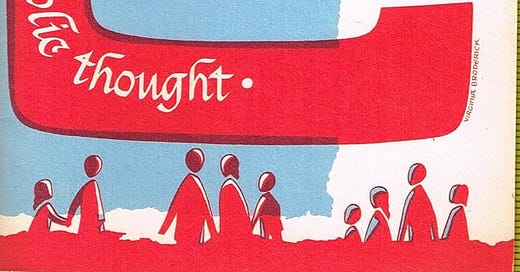
Vatican vs. Madison
When I was in 4th-grade catechism, I was issued a copy of Outlines of the Catholic Faith. Until then, my religious education consisted almost entirely in Bible stories and ritual. Here, at last, was an accessible work of systematic theology. I read it with great care and interest, as you can tell by looking closely at the scan of the dog-eared cover of my personal copy.
If I recall correctly, the Outlines‘ exegesis of the Apostles’ Creed particularly engrossed me. Subsection IX (“The Holy Catholic Church: The Communion of Saints”) is now more remarkable than ever. Exegetical highlights:
A. The CATHOLIC CHURCH is the union of all the faithful people of God under one head.
B. The head of the Catholic Church is its founder, Jesus Christ.
C. The visible head of the Church on earth is the Bishop of Rome, the HOLY FATHER, the POPE.
Thus, this organization brings all of God’s loyal servants under the command of one supreme leader. And what a remarkable leader he is:
E. The Pope is infallible; he cannot err when, as head teacher of the Church, he solemnly defines a doctrine concerning faith or morals.
To be fair, my catechism teachers emphasized that the Pope could err on faith and morals if he were speaking casually. But to elevate his loose talk into certain truth, the Pope need only gravely announce it. Indeed, Authority is one of the three fundamental “Attributes of the Church”:
H. The Pope and Bishops are the lawful successors of the Apostles deriving from Christ the power to teach, to sanctify and to govern the faithful in spiritual matters. (AUTHORITY)
Thus, the Church hierarchy is entitled to rule not because it’s currently doing a good job, or enjoys high approval ratings, but because the founder of the religion founded a self-perpetuating elite millennia ago.
Back in 4th-grade, I barely knew the name of James Madison. Today, I cannot read the Outlines without recalling the warnings of Federalist #51:
If angels were to govern men, neither external nor internal controls on government would be necessary. In framing a government which is to be administered by men over men, the great difficulty lies in this: you must first enable the government to control the governed; and in the next place oblige it to control itself.
In case the link is not clear: Catholic doctrine deliberately and explicitly creates an organization fettered by neither “external nor internal controls.” While it doesn’t explicitly claim that clergy are “angels,” is effectively treats them as such. You’re not supposed to fret, “What if the Pope and Bishops happen to be evil men?” Yes, if an isolated Bishop is bad, the Pope may discipline him. But what if the Pope errs? Well, as a matter of doctrine, he is always free to solemnly declare his statement certainly correct. And if you don’t agree with the visible head of the Church, you are defying not only its invisible head – Jesus Christ – but God himself.
If the Church fused its spiritual power with temporal might, this would be a plainly totalitarian doctrine, subject to all the horrors of the totalitarian regimes that have blighted the world for the last century. But in case you haven’t noticed, the Church’s temporal might is now rather trivial. I’m more afraid of the state of Virginia than I am of the Vatican. Should we conclude, then, that a Madisonian critique of the modern Church is obsolete?
Not quite. Sure, Catholic adults are now legally free to ignore the Church if they find its “infallible” claims unconvincing. This is no mere formality; a large majority exercise their right to pick and choose. For example, only 13% of U.S. Catholics who attend weekly mass agree that contraception is morally wrong. But if the clergy engages in gross misconduct, the Catholic Constitution still stipulates that the faithful must rely on the clergy to self-police.
I’m tempted to say, “The results are predictable,” but they’re worse than I would have predicted. A Best Picture award for Spotlight notwithstanding, the Vatican is caught in yet another massive wave of accusations of child sexual abuse. And the Pope’s reaction is, as Madison would predict, defensive at best. He could infallibly declare that anyone who abuses a child burns forever in hell without hope of redemption. He could order his underlings to surrender every incriminating document to secular authorities so the wrong-doers can rot in prison here on Earth. Instead, he calls for “silence” and “prayer.”
Anti-Madisonian incentives aren’t the whole story of the scandal. Demographics are obviously important: Catholicism is the world’s second-largest religious denomination, so it would contain numerous abusers even if the rate of abuse were low. The most numerate defenders of the Church have argued that its clergy are “no worse than other males,” but this seems very wrong. The John Jay Report found that 4% of U.S. clergy from 1950-2002 were accused of sexual abuse, which is far beyond the share of American males who ever faced such allegations. Given the Church’s vigorous efforts to silence such allegations, the reasonable conclusion is that true offenses were more than proportional to allegations. Clerical abuse is a rare scandal that’s probably bigger – not smaller – than it looks.
James Madison was just a fallible mortal, but he knew human nature: If you treat fallen men like angels, you should expect a great deal of deviltry.
The post appeared first on Econlib.











